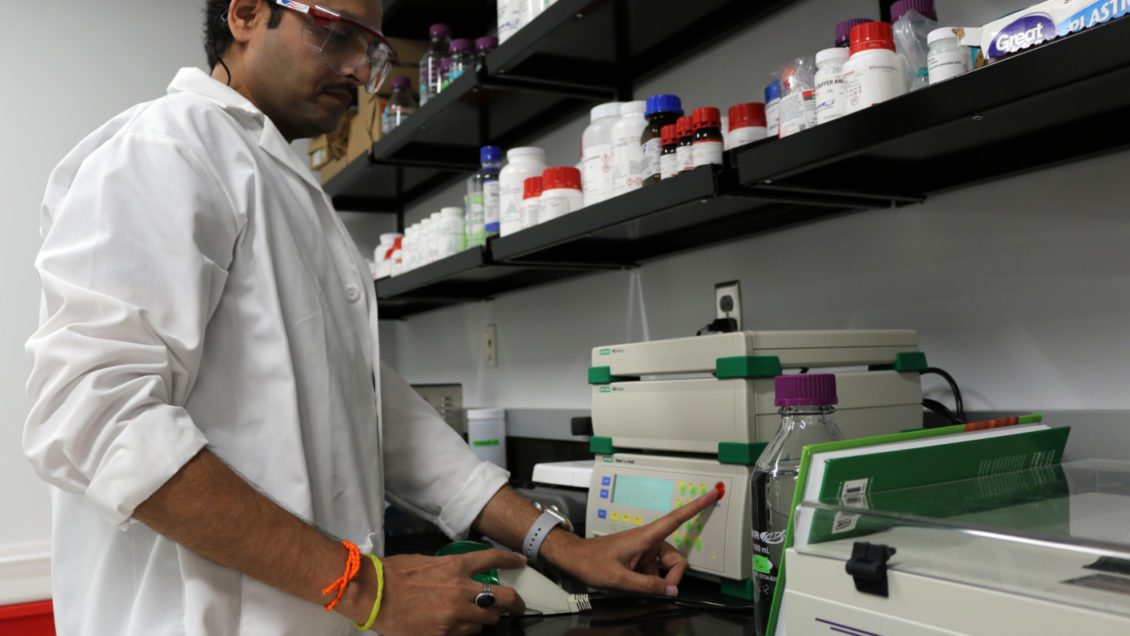FLORENCE – About 3 million people in the United States suffer from celiac disease, but a study by a Clemson University researcher and others may soon bring relief.

Sachin Rustgi, an assistant professor of molecular breeding in Clemson’s Advanced Plant Technology Program housed at the Pee Dee Research and Education Center, is working with researchers across the United States to determine how to create glutenases that can withstand high cooking temperatures.
His hope is to make it easier for people to digest gluten proteins – both healthy people as well as those, like celiac patients, who are sensitive to glutens.
“We want to determine if we can effectively include glutenases in presumably ‘gluten-free’ packaged foods,” Rustgi said. “This will allow people with celiac disease to tolerate foods that are contaminated with gluten/wheat. We also are trying to determine if we can breed these glutenases into wheat.”
[vid origin=”youtube” vid_id=”VXSLQ-igMZI” size=”medium” align=”left”]
Glutens are proteins found in grains like wheat, rye and barley. When flour is mixed with water, the gluten proteins give the flour a glue-like consistency, making the dough elastic and giving bread the ability to rise when baked. Gluten also provides a chewy, satisfying texture. The two main proteins in gluten are glutenin and gliadin. Gliadin is believed to cause most of the negative health effects. Glutenases are enzymes needed to break down glutens in foods to make these foods easier for people to digest.
“Even healthy individuals cannot digest gluten proteins completely, hence the bioavailability, or the human body’s ability to digest, absorb and metabolize these proteins is poor,” Rustgi said. “The difference between a healthy and sensitive individual is healthy individuals are able to flush undigested gluten peptides out of their system. In contrast, in sensitive individuals, these peptides sneak through their intestinal membrane and get recognized by immune cells.”
Once gluten is recognized by immune cells, a cascade of events occurs that leads to the removal of microvilli, peg-like projections, on the surface of the intestinal membrane. This lessens the body’s ability to absorb nutrients. These glutenases could improve the bioavailability of gluten proteins for all people, healthy and sensitive.
Celiac disease is a digestive disorder that damages a person’s small intestine. People with celiac disease cannot eat gluten. This disease can cause long-term digestive problems and keep people from getting nutrients they need.
Glutenases needed to break down glutens cannot withstand the high temperatures required to process or cook foods. Preliminary results from the study show certain glutenases can be made to withstand high temperatures needed to cook or process foods. But more extensive study is needed.
“This is promising for people who suffer from celiac disease,” Rustgi said. “Once both enzymes have been developed, wheat grains, which include a combination of these glutenases, could be produced. After necessary testing, this may provide an alternative treatment for celiac disease.”
In addition to Rustgi, others involved in the study are: Claudia Osorio, Nuan Wen, Diter von Wettstein and Shannon Mitchell of Washington State University, and Jaime H. Mejías of Institute of Agricultural Research (INIA), Chile.
-END-
This work is supported by the NIH grants 1R01 GM080749 – Q7 01A2, Clemson Faculty Succeeds grant 15-202-EQUIP-5701-430-1502211 and NIFA Hatch/Multi-state grant (S009).
Get in touch and we will connect you with the author or another expert.
Or email us at news@clemson.edu

